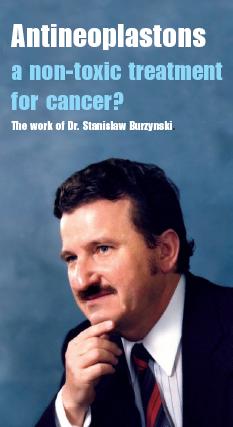This article covers the work of Dr Burzynski. The work has sparked a great deal of controversy. There are those that think he really has made an important breakthrough in a non-toxic therapy and that the FDA and pharmaceutical companies are just trying to silence him, while others argue that, even 30 years on, there is no definitive single Clinical Trial on his work. However, a decade on from this original article, other scientists around the world are claiming that peptide replacement can work.
By analysing the urine of cancer patients compared to healthy people, he discovered there were missing peptides in the cancer patients. His solution? ’Antineoplastons’.
Years of wrangling and court cases in Texas seem now to be ended. During that time pharmaceutical companies tried to patent the antineoplastons and failed. ’Why - if they don’t work?’ argue the fans.
Now, in his 2011 video, Burzynski says that his work is approved at Clinical Trial II level and that all patients are part of a Clinical Phase III trial. Skeptics say that putting patients into a trial is the only legal way he is allowed to treat anybody.
It’s not my job to judge - just to pass on the information. You must make your own decisions. His work is being monitored by the FDA, he treats many different cancers, with a bias to brain tumours, and he claims to have developed the only non-toxic treatment that has actually been proven to cure a cancer. He.has a factory producing the peptides and over a hundred people working for him. No surprise then that his private clinic and treatments do not come cheap.
A decade later, and he is not alone in thinking missing peptides can be replaced to 'cure' cancer - Israeli scientists claim this too. And in Germany, sophisticated blood analysis and genetic sequencing is being used to prepare vaccines of missing peptides.
At CANCERactive we try to provide balanced information, what you do with it is your business.
The work of Dr. Stanislaw Burzynski
 For almost 30 years one man has pioneered an alternative therapy, originally for brain tumours but which now seems as widely applicable to any cancer. After threats, lawsuits and raids on his premises is he finally being accepted into the mainstream, with the FDA closely monitoring his work in clinical trials and approval expected shortly? Chris Woollams reports.
For almost 30 years one man has pioneered an alternative therapy, originally for brain tumours but which now seems as widely applicable to any cancer. After threats, lawsuits and raids on his premises is he finally being accepted into the mainstream, with the FDA closely monitoring his work in clinical trials and approval expected shortly? Chris Woollams reports.
The case of the missing peptides
In 1970 a young Polish research scientist, Stanislaw Burzynski MD, PhD, arrived as an Assistant Professor at Baylor College of Medicine in Houston, Texas.
His prime interest - an interest that he had cultivated since his time as a graduate student - were urinary peptides in blood and urine (short chains of amino acids) and their anti-cancer activities.
He had originally noticed a difference in peptide content between the blood and urine of healthy people and that of cancer patients. The fact that fascinated him was that normal healthy individuals had much higher levels of certain peptides and that these peptides not only helped in the process of communication between cells (and thus identification of rogue cells), but were also known to possess the ability to stop cancer growth in vitro. Similar studies at Leeds University had shown the presence of these peptides, but no follow-up analytical work was done with them.
In case you don’t know, peptides are short chains of amino acids, whilst proteins are long chains of more than 50.
Quite early on in his work, he concluded that these peptides somehow affect the unique biochemistry of the cancer cell. He managed to isolate about 120 peptide fractions, amino acid derivatives and organic acids for his studies. These he termed antineoplastons, and he prepared four formulations (produced synthetically), which were active against cancer cells.
It is now clearly understood that, in cancer, the ras gene can cause a cancer signal to be made (genes that cause cancer are called oncogenes). It is also known that another gene (p53) normally suppresses tumours (and turns off the cancer process), but somehow fails in cancer patients.
Burzynski showed that antineoplastons both turn off the ras gene and restimulate the p53 suppressor. He thinks of antineoplastons as ’switches’ turning some things off and others back on. Antineoplastons provide the messages which tell the genes to act. Without enough of these crucial peptides the risk of cancer is higher.
Antineoplaston peptides are made in various parts of the body, but primarily in the liver and the kidneys. Two types exist: ones with a very specific activity for specific tissues, and others that have broad scale activity for a wide variety of tissues.
A cancer patient has a double problem. They make far less of certain peptides than are needed (probably because the genes that control them are switched off by modern toxins or poor diet); and also the cancer cell sends out messages to tell the kidneys to excrete them, thus protecting itself.
The FDA acts
And then it all went pear-shaped. Burzynski’s discoveries were at first applauded and he was offered a higher post but in Baylor’s Department of Pharmacologya job he turned down.
Almost immediately his research grant was not extended and he was left outside of ’the system’.
In 1983 he applied to the FDA for new drug permits for antineoplastons, but was turned down. A lengthy legal battle then took place which included the FDA raiding his offices.
Since there was no statute in Texas preventing him from ’treating’ patients with this essentially non-toxic solution, he set up shop for himself. However the US District Court then banned him from shipping his product across state borders. Since he couldn’t stop patients from taking the product back to their homes in other states, he was subjected to Grand Jury investigation, and eventually tried on over 70 charges. One by one he beat all of these and, 14 years later, the FDA and the District Court gave in. An important part of the defence was that these antineoplastons work!
Brain tumours
In 1991 a group of investigators from the National Cancer Institute went to the Burzynski Research Institute in Houston and reviewed his ’best 7 cases’, where patients - mainly with astrocytomas and glioblastomas - had experienced complete responses to the ’drugs’. The NCI recommended a Phase II clinical trial, which began in 1993 and was overseen by such eminent institutions as the Mayo Clinic and Sloan-Kettering Cancer Center. However, only nine patients were assessed, and the final report concluded that the results were insufficient to recommend antineoplastons for wider use.
Burzynski was extremely unhappy, especially when he discovered that the doses used had been far lower than those he was giving his own patients. Indeed, he published a letter stating that the levels used during the clinical trial were previously established by him to be ineffective!
Meanwhile Burzynski undertook his own studies. In a study of 36 patients (all with brain tumourssome of highly malignant glioblastoma multiforme) he produced the following results:
- 9 (25%) had a complete response, i.e., disappearance of the tumour on an MRI scan.
- 7 (19.5%) had a partial response i.e. more than 50% reduction on MRI scan.
- 12 (33.3%) were stabilized.
In his report Burzynski noted the general consensus in the medical community is that these brain tumours cannot be cured by chemotherapy, and the response rate is only modest. However he, himself, achieved a complete tumour resolution, or over 50 percent tumour reduction, in 16 of his 36 patients.
Burzynski continued his efforts. In 2006 he claimed he had over 2000 patients in full clinical trials all supervised by a more agreeable FDA. He also gained FDA approval for a supplement for home use, but he stresses that this is not, by any means, a replacement for formal therapy.
Burzynski was back then highly confident that the FDA would fully approve one of his oral formulations containing antineoplastons by the end of 2007, with approval for an intravenous formulation by the end of 2008. Somehow it didn’t happen.
So, are we any clearer?
Currently researchers in Kurume University in Japan are also exploring the effects of antineoplastons, not only with all types of brain tumours, but also with colon and liver cancers.
Numerous genes have been identified and linked to a number of cancers; others are specific to a certain type of cancer. Burzynski and the Japanese are studying which genes are blocked, and which are over active with which cancers. It is early days but the full picture may be less than ten years away and it could have wonderful results. The highly prestigious MD Anderson Cancer Center in Houston, confirm Burzynski’s initial antineoplaston theories. But a single, good quality clinical trial wouldn’t hurt, would it?
Recently, Burzynski has developed new formulations, and believes that far more active packages will be developed in the future. Indeed he believes antineoplastons will eventually become a mainstream treatment for all cancers.
So is Burzynski just another brick in a wall of failure or is he on his way to a Nobel Prize with his pioneering, non-toxic treatment? The factory is now huge, with large numbers of employees - this is no longer a man and an idea. We are encouraged that the FDA is now monitoring and reporting on his work - proper data would show once and for all whether this was a real cancer cure, or quackery.
Postscript - the promise of peptides
In 2019, Israeli scientists claimed to have found a cure for cancer in MuTaTo. Their system uses bacteriophages to make peptides, and then uses peptides to overcome deficiencies in cancer patients. Sounds familiar?
Go to: Israeli Scientists claim cancer cure
Germany has many clinics working on vaccines. Of note is CEGAT, where scientists perform complex blood analysis and genetic sequencing to discover the deficiencies and then use peptides in immunotherapy vaccines to combat them.
Go to: CEGAT
.
 At last - the definitive, research based book on how to build a diet to help beat cancer. Click here to read about it.
At last - the definitive, research based book on how to build a diet to help beat cancer. Click here to read about it.
The Burzynski Clinic is at:
9432 Old Katy Road, Suite 200
Houston
Texas 77055-6330
USA
Tel. (001) 713 335 5697
Fax. (001) 713 335 5699
Email: [email protected]
www.burzynskiclinic.com